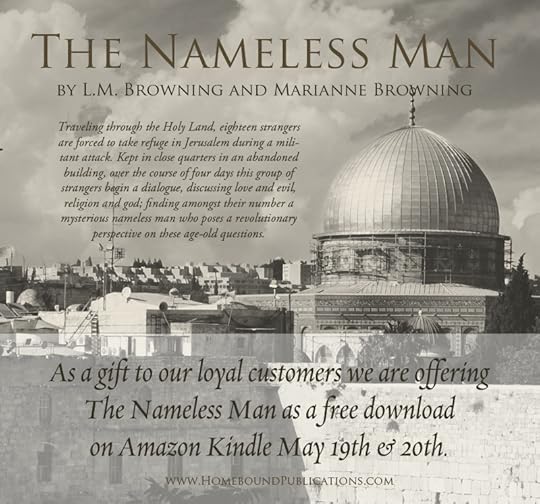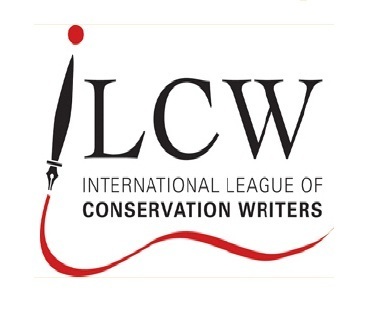L.M. Browning's Blog, page 22
June 7, 2012
Last of the Poetic Series First Editions | Bookstore Sale
On April 24, 2010 I saw the release of Oak Wise: Poetry Exploring an Ecological Faith —the first book I ever had published. Over the 9 months that followed I watched as the other two titles in my contemplative series were released: Ruminations at Twilight and The Barren Plain. Today, over 2 years later, I met with my publisher to collect the remnants of the print run.
Surrounded by the remaining copies of my poetic series, I close one chapter of my writing career and prepare to begin the next. In my bookstore I am currently offering what few remaining copies I have of the series. You can now purchase all three books in a special gift set for only $19.99 [+ shipping]. All books will be signed by me; I would even be happy to personalize them for you. (If you make a purchase via my bookstore I will contact you within 12 hours to find out what you would like written in the books.) Be aware: there are only 12 sets remaining in the print run. Once they sell out—they sell out. At that time I will remove the gift set from my bookstore and make a post marking the end of the promotion. (Full refunds will be issued to anyone who should purchase a set after the shocks have sold out.)
To close, I would like to thank all my friends, colleagues and family who have supported me during the last years, which have been hectic to say the very least. I hope you all enjoyed the series. I feel honored by all those whom have found room for me on their bookshelves these last years. I look ahead to my next novel due out next autumn.
With Gratitude-
L.M.
Visit the Bookstore by clicking here or scroll down to add a set of the series to your cart.
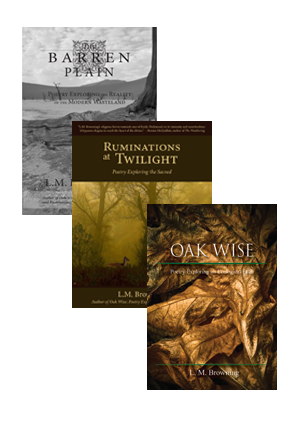
The Contemplative Poetry Series (Signed 1st Editions)
(Includes 1st Editions: Oak Wise, Ruminations at Twilight and The Barren Plain)
Through this special offer you can order all three first editions for a discounted price. We have a limited number of 1st editions left. As of June 30th 2012 the books will be out of print. * Quantities are limited.
Special offer price: $19.99 |UPDATE: 7 gift sets Remaining
June 6, 2012
Poet, Writer, Editor L.M. Browning Talks About Publishing Poetry and Poetic Prose | An Interview with Mary Harwell Sayler
A longtime student of religion, nature, and philosophy, L. M. Browning has received Pushcart nominations, written a series of contemplative poems, and released a full-length novel. Besides her prolific work as poet, writer, and artist Leslie is co-editor and partner at Hiraeth Press (Independent Publisher of Ecological titles) and Associate Editor of the bi-annual e-publication, Written River: A Journal of Eco-Poetics. She’s also Founder and Executive Editor of The Wayfarer: A Journal of Contemplative Literature and Founder and Lead-Editor of Homebound Publications.
Mary Harwell Sayler: Wow, Leslie, that’s an impressive list! I could chat with you for hours, but readers will probably want to know about the literary presses and journals you represent. Tell us about the unique perspective of each.
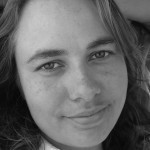 [L.M.:] At Hiraeth Press our publications reflect the ideal that falling in love with the Earth is nothing short of revolutionary and that, through our relationship to wild nature, we can birth a more enlightened vision of life for the future. We are passionate about poetry as a means of returning the human voice to the polyphonic chorus of the wild, and we produce nonfiction books as well.
[L.M.:] At Hiraeth Press our publications reflect the ideal that falling in love with the Earth is nothing short of revolutionary and that, through our relationship to wild nature, we can birth a more enlightened vision of life for the future. We are passionate about poetry as a means of returning the human voice to the polyphonic chorus of the wild, and we produce nonfiction books as well.
MHS: What does “Hiraeth” mean?
[L.M.:] The Welsh word “hiraeth” encapsulates the spirit by which we strive and hope the books we publish will inspire. A direct translation might be something like “intense longing to belong,” though a more literary reading and a look at its role in medieval Welsh poetry reveals that it is a deep longing of the soul for one’s original homeland. Here at Hiraeth Press we believe that our collective human homelands are the still-wild places of the Earth. We long for a more ecologically and spiritually sane world and believe passionately that poetry is a form of activism on behalf of the more-than-human world.
MHS: Yes! I’ve always believed we’re to be caretakers of the earth even when we “subdue it” – a biblical phrase that led some to put-down and stomp rather than lovingly tend. I had not thought much about an “intense longing” to connect with all aspects of creation, however, until I discovered Hiraeth Press and realized I had a whole manuscript that connected with this theme in my book Living in the Nature Poem. I’ve talked about that before and surely will again, but right now, let’s hear about Homebound Publications.
[L.M.:] Homebound is my own endeavor. I refer to it as the “sibling” of Hiraeth.
Going back to go forward is the philosophy of Homebound. We recognize the importance of going home to gather from the stores of old wisdom to help nourish our lives in this modern era. We choose to lend voice to those individuals who endeavor to translate old truths into new context. Our titles introduce insights concerning mankind’s present internal, social and ecological dilemmas.
The stories humanity lives by give both context and perspective to our lives. Some older stories, well-known for generations, no longer resonate with the heart of modern man, nor do they address the present situation we face individually and as a global village. Homebound chooses titles that balance a reverence for the old wisdom while at the same time presenting new perspectives by which to live.
So often in this age of commerce, entertainment supersedes growth; books of lesser integrity but higher marketability are chosen over those with much-needed truth but small audiences. Homebound focuses on the quality of truth and insight present within an author’s writing before any other considerations. We seek books written by soul-oriented individuals putting forth their works in an effort to restore depth, highlight truth, and improve the quality of living for their readers.
MHS: Readers of The Poetry Editor blog will especially want to hear if your publications are open to poems and, if so, what types you hope to find.
[L.M.:] Hiraeth Press is accepting poetry submissions with a $10 entry fee for our Wild Earth Poetry Prize until December 1, 2012. Each year we choose 2 selections from the entries and offer the authors a publishing contract, 10 complimentary author copies, and a generous 30% royalty contract. The winning authors will also receive a feature spread in Hiraeth Press’ biannual journal, Written River: A Journal of Eco-Poetics.
As for Homebound Publications, we are currently open to query letters only. We have filled our publishing schedule for 2012-2013 but are always on the lookout for a project that is exceptional. Authors are welcome to submit a query letter outlining a project and their publishing experience (if any.) If the project sparks our interest, we will request the full manuscript.
It is our intention at Homebound Publications to revive contemplative storytelling. We publish introspective full-length novels, parables, essay collections, epic verse, short story collections, journals, and travel writing. For fiction titles our intention is to introduce a new mythology that will directly aid mankind in the trials we face at present.
MHS: What makes you seriously consider one poem or manuscript over another?
[L.M.:] It is a matter of the right alignment of talent, character, and professionalism. Personally, I look for a piece that is polished, approachable and insightful, but other factors go into my decision too. I look for a professional—a writer who understands the business of writing; one who is organized and level-headed. You would be surprised how much about a writer’s character and work habits can be gleaned from a proposal. Did the author follow submission guidelines or submit blind? Did they proofread their proposal or send it off in haste? Is the proposal laid out in an organized manner or is it jumbled and incomplete? All these things tell me a little about how authors approach their craft and whether this person is someone who would be easy to work with or high-maintenance.
As a small publisher I work with my authors very closely for upwards of 4 years. As such, I look for someone with whom collaboration would be a joy rather than a hassle. Honestly, I don’t care if an author writers a bestseller. If they are going to be a trial I would rather take a pass. I opened Homebound Publications to give voice to deserving writers neglected by the mainstream—to ensure that the mainstream isn’t the only stream (as our mission states.) If I am going to put in hundreds of hours helping authors develop their project and their career, I want to know I am working with a person of kindness and quality.
MHS: Good idea. After you decide to publish a book of poems, what are the next steps authors can expect in the publication process?
[L.M.:] If I had to break things down I would say there are seven “stages” in our process:
1. Review of submission
2. Acceptance and contract negotiation
3. Proof-reading and copyediting
4. Interior and cover design
5. Pre-publication promotion
6. The release
7. Post-publication promotion.
The review of the proposal is pretty much self-explanatory. We receive a proposal from a prospective author, and the manuscript makes its way around the editorial table. At the end of each season we hold a general press meeting where we decide on our titles for the forthcoming year(s).
After a manuscript is accepted a contract is drawn up. The author is sent the contract and has a few weeks to review it. During this time the lead editor will be available to the author for questions regarding the contract. I always like to give authors plenty of time for this step; I want them to feel comfortable and fully secure in their decision.
After the contract is signed the manuscript moves into proofreading and copyediting. In Homebound two separate Associate Editors read the accepted manuscript and put forth corrections at which time we [the editorial staff] contact the author with our proposed revisions and begin the process of putting together the final draft.
The next step is cover and interior design. In Homebound and Hiraeth we like to give our authors input regarding the design of their cover. (Most publishers do not include their authors in this phase.) We speak to the authors and try to get an idea of the vision they have in their mind of the final product. We then search for suitable artwork, gather 5 or 6 possible images, and share our suggestions with the author. Once a piece of art is agreed upon, our designer sets about the task of laying out the cover. When he/she is done the author is sent the mock-up and gives us feedback. This process continues until a final design is agreed upon.
While the manuscript is being typeset and the cover designed, the promotion of the book is being devised. As a small publisher we don’t have the resources for a nation-wide ad campaign, but this doesn’t mean we skimp when it comes to marketing. We do everything we can to promote our books. For example, we:
Arrange interviews and reading events.
Post previews of the book on our homepage and social media.
Design media kits.
Execute e-campaigns in the USA, UK, Canada, and Australia.
By the time the release of the book comes along, marketing has been underway for at least 2 months. Most authors regard the publication of their book as the end of the road, but actually it is the beginning of the project. When the book is released we pass along a great responsibility to our authors, hoping they will take their book and run with it. At both Homebound and Hiraeth we give our authors a generous royalty (well above the standard 7-12%) because we expect them to work with us to promote the book and ensure that it reaches as wide an audience as possible.
MHS: Poets and writers sometimes turn to self-publishing because they want to retain control over their work. In what ways does a small press give them more voice or involvement than a larger publisher might?
[L.M.:] Whether or not a publisher is a help or a hindrance, depends on which publisher you choose. You are correct – signing with a large publisher entails giving up a great deal of control over your project without any assurance of wide-scale success, and the same can be said for indie publishers. As a writer, I have worked with small publishers and had little control over the final product. At Homebound and Hiraeth we are publishers, but everyone involved in the presses are also working writers. As such we have sympathy for our authors; we understand that they have put significant time and effort into their project, and they deserve involvement and as much of the profits as we can give them. We genuinely want our authors to be happy with the final product.
Self-publishing is sometimes the proper course of action, especially if your book has a small audience, but self-promoting is a full-time job and can be the end of your career if you don’t know how to present yourself. The key to self-promoting is to let your work speak for itself; it is not selling yourself.
Self-publishing used to be the kiss-of-death in the publishing world. Of course, Kindle-direct publishing has changed the face of the industry. While there is still a stigma attached to self-publishing, the philosophy has arisen that publishing is a right not a privilege and more and more authors are deciding to skip over a publisher in order to retain more rights and keep more of the profits. In the end, however, I think having a publisher can be an asset. Publishers stake their reputations on your talent, they expose you to their established audience, and your editors can use their connections to expand your network. But in the end, it all depends on who your publisher is. The fact that Homebound and Hiraeth have established such wonderful reputations among writers and reader alike is one of my great sources of pride.
MHS: Besides editing, you write poetry and nonfiction too. When you submit your own poems or manuscripts, do you mention your editorial work or does that work against you, for instance, if the editor holds you to a higher standard?
[L.M.:] I mention my editorial work; whether or not it works for me or against me has yet to be seen. Some who review my work may feel that my experience as an editor gives me an understanding of the process ahead and will therefore make me easier to deal with as a writer. Others might look at my CV and conclude that, as an editor, I will seek more control over the project than a writer with a different background and I will therefore be a pain.
As for whether I hold myself to a higher standard…. When I choose to publish my own work through Homebound Publications—the publishing house that I own—I am forced to hold myself to a higher standard. As Lead Editor I can publish anything I want. This is a wonderful freedom but also requires me to push myself—play editor to myself, as it were. As a writer who owns a publishing house, I could publish 1-2 books a year, but the quality wouldn’t be there. One of the greatest flaws in the independent publishing industry is that books are rushed into publication before they are ready. Looking back on my early works, I criticize myself harshly for my haste. While proud of what I produced, I know now that I could have made my work tighter—more refined if I hadn’t rushed the manuscript into print. Now a more seasoned writer, I tend to take things slower. I would rather release a book every 2-4 years and have the text be strong than take a thin draft of a vague idea, package it, and start selling. It serves only to hurt my own career in the long run.
MHS: Well-said. Thank you so much for your excellent insights, honesty, and information, Leslie. Before we close, is there something you especially want to say to other poets, writers, or editors?
[L.M.:] To editors I would say: Set marketability aside and choose a manuscript based solely on merit.
To other poets and writers I would like to say: Don’t seek approval from editors. Don’t look outside yourself for affirmation that your work is good. Decide yourself whether you are pleased with your work and your chosen messages. Then, no matter the rejection you might face in your career as a working writer, you can forge ahead undeterred by those who cannot appreciate your vision. Remember, editors don’t always make decisions based on the merit of a manuscript but its marketability, so their feedback doesn’t always reflect your talent but rather their sales prospectus.
One of the difficult parts of my job as an editor is sending out the very rejection letters I hate receiving as a writer. I deal with rejection in-stride, just as every writer must learn to do, and I try not to let negative feedback diminish my belief in my own voice.
MHS: And such a lovely voice too! Many thanks, Leslie, for letting us hear what you have to say.
______________________________________________________________________
 If you have trouble finding your voice, visit The Poetry Editor website to see if professional feedback might help your writing. Also see news from Hiraeth Press on their June 15, 2012 publication of Living in the Nature Poem by Mary Sayler.
If you have trouble finding your voice, visit The Poetry Editor website to see if professional feedback might help your writing. Also see news from Hiraeth Press on their June 15, 2012 publication of Living in the Nature Poem by Mary Sayler.
June 3, 2012
Self-sufficient | A Poem & Journal Entry
Self-sufficient
by L.M. Browning
A stable house cannot be build upon the shifting sand. The mind needs stability. A set of fundamental truths that it need not question. Without this foundation the mind has no anchor to reality and you find yourself adrift in the unknown. Bordering the surreal; lost in the gray between what is real and illusion, unsure what is genuine. Nothing can be built without this foundation—we cannot begin to trust any truth come to without first securing this baselines knowledge.
Years ago, everything that I held to be true from my religion, to my personal relationships, to my preconceived notions of reality, was shaken. The upheaval, while difficult, brought about needed change; however, when long-time certainties were pulled out from under me my mind did struggle while I dwelt in that state of full-doubt.
It is courageous and wise to demand that the truths we are given be justified, no matter the proclaimed authority of the sources. Doubt uncovers lies and in this skepticism can indeed be a virtue. Yet when you call into doubt the entirety of your world be sure to redefine the foundational truths your mind rests upon.
—Stonington, Connecticut, December 22, 2011
Self-Sufficient
I drown in the what ifs and whys
Live off the hopes
and reach for belief.
Years spent waiting
for a God,
for a lover,
for a father,
for a mother
for a savior
for an answer.
Thinking myself incomplete
without any or all.
The time has come to explore
all that is within this one soul.
…all that I am,
rather than musing further
over all that you could make me.
Original Image: Blue Mornings on the Concord River 2011 (c) L.M. Browning | Text: L.M. Browning (c) 2011 *All Rights Reserved
June 2, 2012
Our Lowest Point | A Journal Entry
by: L.M. Browning
“The gross heathenism of civilization
has generally destroyed nature, and poetry,
and all that is spiritual.” - John Muir
I write spiritual verses rich with ecological references. This paints an image in people’s minds as to what I must be like. After reading my work, most tend to envision me as the equivalent of Laura Ingles Wilder sweeping over flowered hilltops in a long sundress. When I reveal to them that I grew up a raging tom-boy in a suburban slum they are a bit taken aback.
I found my love of nature while exploring the small bit of wilderness near our apartment projects. It consisted of a few acres of wood behind the local high school and a small drip of a pond. I spent most of my early childhood here—knee-deep in muck, stalking frogs and painted turtles, hooking Catfish and building forts.
Our neighborhood certainly wasn’t a “ghetto” when compared to the harsh inner-city. It was more the equivalent of “the other side of the tracks” where the poor kids lived. Drugs, gangs and murders had been carried out in our neighborhood, making it “known” to the rest of the town. Out of the fourteen close friends I had as a child only six graduated high school and four of the fourteen have gone on to do serious jail time. Except myself and one other in the group, all had children within their teens, leaving them without an education living, check-to-check working menial jobs. Poverty, addiction, violence—we dealt with these issues starting at a very young age. One of my most-vivid memories that in my opinion sums up what we faced growing up, is that of watching a 3 or 4 year old boy sitting in the parking lot, snorting sand through a straw— imitating the behavior he saw each day (his mother being a addict.)
Despite being raised in such a bleak and harsh place, when the time came to venture into “the big city” for business matters as an adult, I was utterly out of my element. I am not a city person. As much as I have experienced a “street upbringing” I am a small town girl who is bombarded by the city. I am too thin-skinned to reside in the city. Do not mistake this as an omission of weakness. I am this way due to a conscious choice to remain sensitive to my surround.
When reflecting on what leaves me so unsettled when I venture into the city, these are the conclusions to which I come: The city, I suppose, is meant to be a pinnacle in mankind’s achievements—architecture, culture, civilization; however, in my view, there is nothing less civilized than the urban areas I have visited. Its character, to me, has always been one of rudeness. The sounds, the sites, and the smells are offensive to me. In my mind, “civilization” equals peace, enlightenment and harmony—a transcended way of living. There is nothing peaceful or harmonious about a city.
I write this on a train, returning home to my small Connecticut village after attending to business in Boston.
—Boston, Massachusetts | July 24, 2011
Lowest Point
Drunkards passed out,
mouths hanging open
as they lie sprawled out
on the stained benches
waking long enough
to kill-off the plastic bottle
of cheap liquor,
drooling on themselves
then passing out once more.
Passing cars kick up
the murky water in the streets,
that smell of sewage
in the humidity.
Cities—mankind’s accomplishment
are barbaric outposts.
True civilization
is found in the places man
has yet to touch.
Humanity need not create civilization
all we need do is not screw it up.
Image by: Grimy Train Window by: idleformat [Flickr Handle]
May 14, 2012
Download the Kindle Edition of The Nameless Man Free May 19th & 20th
As a gift to those who have supported me throughout my endeavors, I am making The Nameless Man free on Amazon’s Kindle Store for a period of 48 hours. On May 19th and 20th you can download the Kindle Edition of The Nameless Man free of charge. Understanding that times are difficult for all of us right now; I wanted to find a way to give back to my readers. I hope you enjoy!
Click here to view the video on YouTube.
An Interview with Spiritual Author Mary Harwell Sayler
An Interview with Spiritual Author Mary Harwell Sayler
An active poet, freelance poetry editor, and highly ecumenical Christian writer in all genres, Mary Harwell Sayler has 25 books to her credit ranging from novels for young people, a children’s picture book, inspirational romances, a 7-book series of devotionals and two life-health encyclopedias, one of which the American Library Association (ALA) honored as a nonfiction academic favorite for the year. In addition to her traditionally published books, Mary has had over 1,500 nonfiction articles, devotionals, Bible stories, or children’s stories and over 300 poems in journals, anthologies and e-zines. Her latest work is a collection of poetry, entitled Living in the Nature Poem, set to come out through the eco-publisher Hiraeth Press on June 15th. In my capacity as Co-Lead Editor for Hiraeth, I recently had the opportunity to sit down with Mary and discuss the inspiration for her upcoming work.
In preparing for my interview with Sayler—a well-known Christian writer, I found myself circling back to reflect on where my spiritual path began, which is something I have not done in some time. Raised a Catholic, the early days of my spiritual journey were spent walking the pages of the Old and New Testament—both of which are familiar topics in Sayler writings. Unfulfilled by the narrow road I was set upon by those around me, I stepped out into the wider world of spirituality. Emerging into adolescence with a strong spiritual curiosity, I started to veer away from the traditional gospels and moved into the apocryphal verse, the pinnacle of this was reached when I delved headfirst into the 1000-page text that is Nag Hammadi library, which has in recent years become the object of much speculation given that it includes the Gospel of Thomas {the only Gospel in Christianity known to have survived potentially written from the first person perspective of Yeshua [Jesus.] As the years passed, I eventually went beyond Catholicism as a whole and started the long pilgrimage into my own personal spirituality, stopping for years at a time within the villages of other world religions including: Tibetan Buddhism, Judaism, Druidry and Shamanism.
Just as I carved out my own literary identity and spiritual philosophy so, too, has Sayler. Through each one of her articles and with each book put forth into the mosaic of her work, she has shaped a unique literary voice that carries across the boundaries of form, style and subject. Firm in her beliefs but by no means narrowed by them, Mary’s spiritual insights draw readers from all walks of faith.
L.M.: Welcome Mary. Thank you for speaking with me today. Let us begin at the beginning shall we: Where did your spiritual path begin?
M.H.S.: Before I can remember, Mother taught us Bible stories and prayers, but my earliest memory is in a Sunday School Class for 3-year-old’s when we sang “Jesus Loves Me,” and I believed it!
L.M.: My first impacting spiritual experience also took place when I was child. It would seem that those simple but magical moments are the ones that become the foundation for our faith. In my experience as a spiritual author, more and more people tend to be shifting away from traditional religious doctrines, opting instead for a more personal spirituality. Have you found this to be true?
M.H.S.: Yes, definitely. Often this occurs when a local church doesn’t seem relevant because the music, homily or sermon is out of touch or out of date. Or people grow up in a denomination that does not suit them, but they’re timid about visiting elsewhere or, perhaps, think all churches are the same. They’re not – and yet they are! Various moves around the country in early years of marriage showed my husband and me that basic beliefs hold the Body of Christ together, but each denomination has its own place in that body similar to an arm or lung or heart. So even though my Christian life started in a hands-and-foot church, as an adult I began to grow more spiritually when I found an eyes-and-ears home with stained glass windows, gorgeous music and poetic liturgy. Centering prayer and books by Christian mystics nurture me spiritually too.
L.M.: Prayers of course come in many forms. Personally, I find that walking through the calm of an untouched nature place—through tall grasses or along the shore—can resonate within like a silent prayer. Your next book reflects on finding the sacred in the wildness of nature. Do you hold the belief that the Divine can be found in nature?
M.H.S.: Yes, especially since I believe God called everything natural into being and gave every part of the body of earth permission to just naturally unfold, flourish, be blessed, and become a blessing too.
L.M.: What is the intended message of Living in the Nature Poem?
M.H.S.: We’re part of nature. That’s where we live – in the natural poem of our own body cells, skin or exterior environment as well as the day-to-day poems of our own making. If we’re at one with ourselves, we’re apt to aim for oneness with other people, too, and maybe the whole universe.
L.M.: What inspired the book?
M.H.S.: Actually, the publisher did. When I saw the quality and type of poetry published by Hiraeth Press, I searched my files for poems connected to nature. The individual poems came about, however, because people often seem disconnected – even dis-integrated – and uncertain of themselves or anything. The break-up of relationships in church-families, marriages, and local communities have scattered us from one another, while a heavy emphasis on physical appearance seems to make us seek some other self. Male or female, it’s like we’re trying to clone The Ideal Look to connect with everyone else when we might do well to spend time, getting to know ourselves and our natural surroundings.
L.M.: Do you write in nature or are you a “desk poet?”
M.H.S.: I almost never sit down at my desk to stare at a blank screen. I still prefer pencil and paper to jot down the first line of a poem that catches my attention with its musicality or visual appeal. That opening phrase or first line often appears when I’m “doing nothing,” such as taking a walk in the woods or wading in the Atlantic or lounging on our deck overlooking the little lake out back or whiffing herbs to find one that smells just right for whatever happens to be in the refrigerator.
L.M.: Your current list of projects seems staggering. Atop writing your own work, which any writer can vouch is a full-time job in and of itself, you currently maintain The Poetry Editor blog and website through which you offer advice and critiques to fellow poets. How did this begin?
M.H.S.: I delight in poets and poetry, and I like to teach, but I don’t have time to do the freebies poets frequently request (sometimes demand!) For a while I was getting calls on Sunday mornings and getting emails from around the world, asking me to give poems “a quick read,” which is impossible! I give free resources and tips on writing, revising, and editing on The Poetry Editor blog, but if poets ask me to “take a look” at their poems, I tell them I don’t do quick readings but will do thorough readings as their poetry deserves for the minimal fee found on my website. Poets who are willing to pay a bit for professional feedback usually want to learn and grow as poets. So, critiques give me a chance to encourage their strengths, correct errors and comment on specific areas that need improving. If I have a print copy, I scribble options and suggestions in the margins to help the poets recognize tendencies, revise the poems at hand and find ways to say what they want to say in their own poetic voice.
L.M.: Along with your duties as an editor, is it true that you also judge contests?
M.H.S.: Yes, I judged a couple of poetry contests then about ten years ago began judging poems entered in the annual writing competition sponsored by Writers-Editors.com. That contest has been around for many years, and I’ve known the Director a long time too. She’s very conscientious, so the contest is well-run and entries are “blind,” which means I have no idea who enters what until winners are announced. If, however, I recognize a poem that I’ve critiqued or previously seen, it’s immediately disqualified.
L.M.: Every writer has a “favorite child”—a book from their publication history that they love more than any other. Which is yours?
M.H.S.: This one! I’ve held on to my poems like an overprotective parent, letting them occasionally venture out into journals or e-zines but never quite able to get them together for a book even though I have enough “ready” pieces for more books than Living in the Nature Poem. As I’ve often said, I started writing poems in grade school but, as an adult, wrote everything except poetry. So I am thrilled, thrilled, thrilled to have a publisher like Hiraeth Press to whom I can entrust my poems.
L.M.: I hold on to my journals as well—dating back to childhood. A trunk under my bed is filled with my old writings; while my bookcases are filled with books that inspired me along the way. It would seem that great writers are voracious readers. To whom do you turn in your library when you need to decompress or be consoled?
M.H.S.: Psalms and prophetic poems such as found in Isaiah console me by their spiritual affirmations and assurances. I’ve loved the Bible since I began to read, and the more I read it, the more connected and comforted I feel.
L.M.: As a spiritual writer, what do you think is the “message of the hour”—the truth that needs to be conveyed given the current challenges we face day-to-day?
M.H.S.: I hope Christian publishers get bolder and we members of the church re-member the dis-membered Body of Christ needs our forgiveness, love and healing. We also need a clear eye and melodic voice that often comes in prayer and poetry. Look at the great poems of the past: War and his own people troubled King David into writing many of the Psalms. Society was a mess when Dante wrote The Divine Comedy. T.S. Eliot needed to come to grips with faith in God severely shaken between two world wars. We have similar conditions today, but now, even our weather is in upheaval! We’re in a tough time of economic, environmental, and political disturbances that call for poets to speak with clarity, honesty, beauty, and hope. If the titles of books, movies, and television programs – or the Mayan calendar – give us a clue, we’re also in a spiritually disturbing time when people are worrying about the after-life and wondering if the end times will come through a global disaster, collapse of the ozone, space aliens, or vampire fangs! I’d rather look for Jesus.
L.M.: What’s next? Any plans for reading events?
M.H.S.: Thanks for asking, Leslie, and thank you for such good questions! I want to collect my Bible story-people-poems and religious poetry into at least one book and also schedule some poetry readings soon for Living in the Nature Poem.
Find out more about Mary’s forthcoming book by going to: www.hiraethpress.com. Look for Living in Nature PoemJune 15th

L.M. Browning grew up in a small fishing village in Connecticut where she began writing at the age of 15. A longtime student of religion, nature and philosophy these themes permeate her work. Browning is a two-time Pushcart Prize nominated author. She has written a three-title contemplative poetry series: Oak Wise: Poetry Exploring an Ecological Faith, Ruminations at Twilight: Poetry Exploring the Sacred and The Barren Plain: Poetry Exploring the Reality of the Modern Wasteland. In late 2011 she celebrated the release of her first full-length novel: The Nameless Man, which was co-authored by Marianne Browning. Browning is a partner at Hiraeth Press—an Independent Publisher of Ecological titles. She is an Associate Editor of the bi-annual e-publication, Written River: A Journal of Eco-Poetics. Founder and Executive Editor of The Wayfarer: A Journal of Contemplative Literature and Founder and Lead-Editor of Homebound Publications.
May 10, 2012
Visual Verse Art Collection | Now on Fineartsamerica.com
I recently released a set of 3 new art pieces from a collection I am entitling “Visual Verse”—a meeting of poetry and imagery.
Quotes featured in these pieces are:
“It is time for a rebirth; for the skin of the old life can no longer contain who we are.” {An excerpt from my forthcoming book: Fleeting Moments of Fierce Clarity. Coming December 2012}
“Dreams are the gestation of a future reality. We do not come into being full-formed; we gather, build and grow. So too our matured identity—what we will be and do in this life—grows as well. Our reality begins as aspiration—vague dreams that sharpen over time until they are at last tangible. In nurturing our dreams we enable our future self to be born.” {An excerpt from my forthcoming book: Fleeting Moments of Fierce Clarity. Coming December 2012}
“The cure for our modern maladies is dirt under the fingernails and the feel of thick grass between the toes. The cure for our listlessness is to be out within the invigorating wind. The cure for our uselessness is to take back up our stewardship; for it is not that there has been no work to be done, we simply have not been attending to it.” {An excerpt from Ruminations at Twilight: Poetry Exploring the Sacred}
Visit my e-gallery at Fineartamerica.com today to purchase a print, canvas or greeting card.
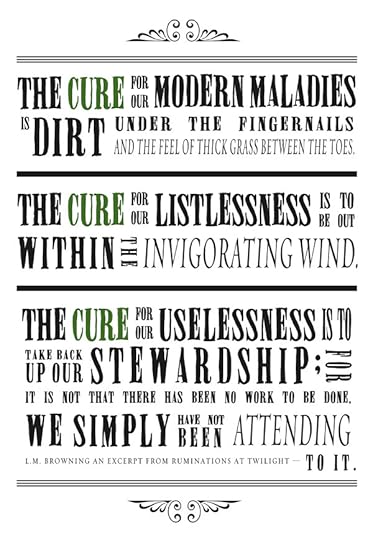
May 2, 2012
Artwork Now Available to Purchase on Fineartamerica.com!
I am very pleased to announce the launch of my new e-gallery. Several pieces of my artwork can now be purchase on Fineartamerica.com. Shipping is available worldwide. Prints are available in multiple sizes and at prices to suit even the smallest budget. Also available are: framed prints, stretch canvas, acrylic print and greeting cards. All pieces are of the highest quality and are printed on archival, acid-free paper.
I would like to thank all my friends and colleagues who have shown their support as I launch this new endeavor. Rest assured, I am not putting down my pen; I am simply reviving an old childhood passion.
Visit L.M. Browning’s Gallery Store
May 1, 2012
A Recent Honor | A Fellowship in the International League of Conservationist Writers
Recently I was given the great honor of membership in the International League of Conservationist Writers as a Fellow. I am both humbled and overjoyed to be a part of this organization. I proudly lend my talents to their cause. I look forward to rolling up my sleeves and lending a hand (or a pen) to future ILCW projects.
For those new to the mission of the ILCW:
“The International League of Conservation Writers is a forum to bring writers together from all over the world who are writing to promote wilderness, nature, conservation, and other means to protect and restore the natural areas, habitats, animals, and plants of our planet. ILCW will present periodic writing awards to authors who excel in this field.”
April 29, 2012
Life-bearer – A Song for Beltane
Life-bearer – A Song for Beltane
The lanes are dusted mauve
as petals of the Hawthorn tree
descend thickly through the summer sky.
Blown by the warm wind
the fragrant leaves
gather along the edge of the grasses—
gilding our world
with soft vivid lines
of pastel distinction.
Night falls.
The swollen moon rises.
The halo outlining the crowns
of the trees intensifies—
their spirit stirring as they
sense Her approaching.
The life-bearing maiden extends a hand
touching the tip of each bough.
Her love surges down
the dormant wood,
buds emerge
and leaves unfurl.
She touches the bough again
and bunches of color
form among the green
—trumpets of lilac, cream and pale honeysuckle—
all announcing the coming summer.
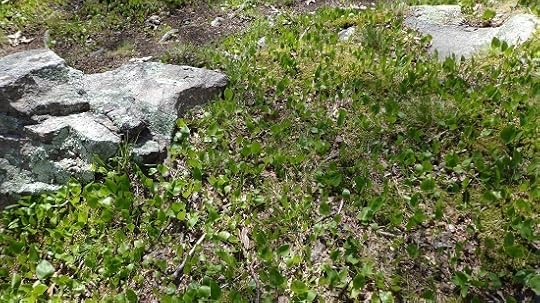
Text May 7, 2010 © L.M. Browning | Original Image © L.M. Browning

